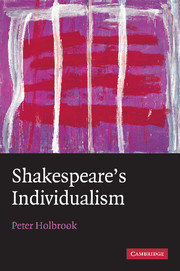Book contents
- Frontmatter
- Contents
- Acknowledgements
- Introduction
- PART I SHAKESPEARE, HAMLET, SELFHOOD
- 1 Hamlet and failure
- 2 ‘A room … at the back of the shop’
- 3 Egyptianism (our fascist future)
- 4 ‘Become who you are!’
- 5 Hamlet and self-love
- 6 ‘To thine own self be true’
- 7 Listening to ghosts
- 8 Shakespeare's self
- PART II SHAKESPEARE AND EVIL
- PART III SHAKESPEARE AND SELF-GOVERNMENT
- Conclusion: Shakespeare's ‘beauteous freedom’
- Index
- References
4 - ‘Become who you are!’
Published online by Cambridge University Press: 06 July 2010
- Frontmatter
- Contents
- Acknowledgements
- Introduction
- PART I SHAKESPEARE, HAMLET, SELFHOOD
- 1 Hamlet and failure
- 2 ‘A room … at the back of the shop’
- 3 Egyptianism (our fascist future)
- 4 ‘Become who you are!’
- 5 Hamlet and self-love
- 6 ‘To thine own self be true’
- 7 Listening to ghosts
- 8 Shakespeare's self
- PART II SHAKESPEARE AND EVIL
- PART III SHAKESPEARE AND SELF-GOVERNMENT
- Conclusion: Shakespeare's ‘beauteous freedom’
- Index
- References
Summary
‘I haven't done a thing today.’ – ‘Why! Have you not lived? That is not only the most basic of your employments, it is the most glorious.’
Montaigne (1258; III.13).A patrimony all our own: the hours when we have done nothing … It is they that form us, that individualize us, that make us dissimilar.
Cioran, Anathemas and Admirations, 16.Hamlet is a key text in Western culture because it concerns the freedom of the self. How is this concern manifested?
The first thing we notice is that Hamlet experiences Claudius's rule as a tyranny. As he says, ‘Denmark's a prison’. A viciously corrupt king sets his spies on the one dissident openly separating himself from the new order. But the play's exploration of freedom and slavery goes deeper. The greatest threat to Hamlet's autonomy comes from within.
After confronting the Ghost Hamlet feels compelled to work on his behalf, to embrace the project set him, to take up vengeance as his task. He must act. Many critics have agreed. (A feature of commentary on this play is how bloodthirsty otherwise mild-mannered scholars become when contemplating Hamlet's inaction.) But it is not only the critics who think Hamlet a failure for neglecting his task. He scolds himself:
Why, what an ass am I! This is most brave,
That I, the son of a dear father murdered,
Prompted to my revenge by heaven and hell,
Must like a whore unpack my heart with words,
And fall a-cursing like a very drab,
A stallion. […]
- Type
- Chapter
- Information
- Shakespeare's Individualism , pp. 70 - 72Publisher: Cambridge University PressPrint publication year: 2010



